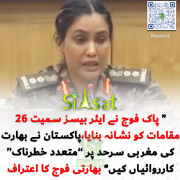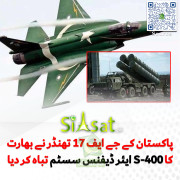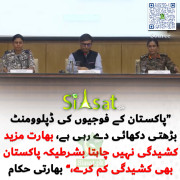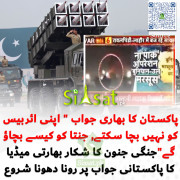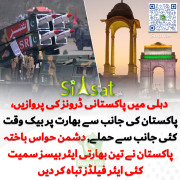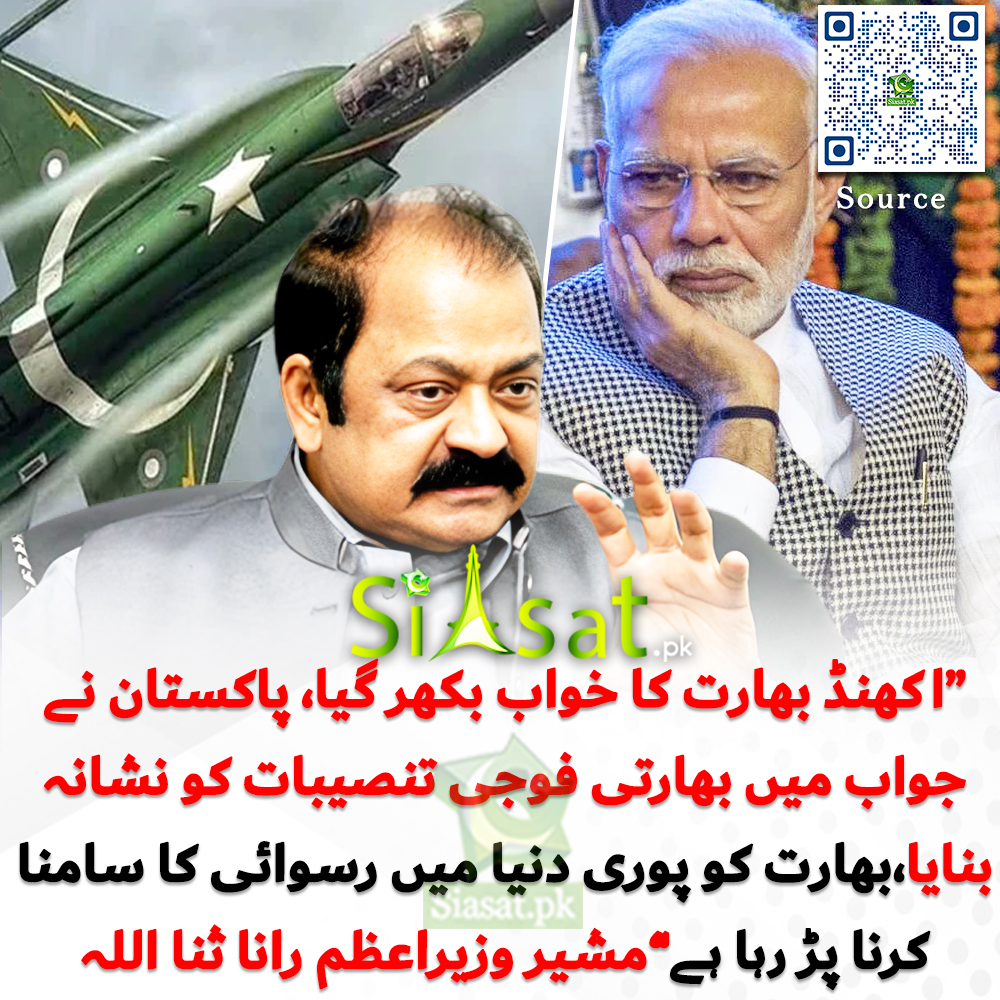C
commander
Guest

Corps commanders never mandated Musharraf Former presidents CSO withdrawn
By Muhammad Saleh Zaafir
ISLAMABAD: Former president General Pervez Musharraf was never formally given the mandate by the corps commanders to promulgate the November 3, 2007, Provisional Constitution Order (PCO) that has been termed unconstitutional by the Supreme Court.
It had never been on the agenda of any of the commanders conferences. General (retd) Pervez Musharraf chaired the 104th commanders conference and it was the last of the conferences chaired by him. He did not even give a hint about his plan to impose the so-called emergency that was a virtual martial law against the judiciary, well-placed defence sources said.
They said the minutes of the conference had been made part of the record and since the same was classified except what was released through the Inter-Service Public Relations (ISPR) nothing had been revealed outside the conference room. Major General Athar Abbas, Director General ISPR, declined to comment on the subject but confirmed that the minutes of the commanders meetings were recorded but it could not be divulged.
The sources told The News that all the principal staff officers of the General Headquarters (GHQ) were present in the conference in question. General Musharraf could have informally discussed his plan of action but no record of the same is available.
The sources said Pervez Musharraf was engaged in constant consultation with the constitutional and legal experts. He is banking upon the endorsement of the then government under Shaukat Aziz and a finding of the corps commanders conference held earlier, the sources said.
According to available excerpts of the conference, the commanders endorsed the pivotal role of General Pervez Musharraf as the president of Pakistan and the chief of the army staff (COAS) in the ongoing reforms process in the country.
The participants (of the meeting) reiterated their support for the pivotal role of the president and the COAS in the ongoing reform process, said the ISPR after the meeting. The ISPR release, in brief, asserted the following:
(1) Corps commanders endorsed General Musharrafs holding dual appointments of COAS and president (2) The Pakistan Army is committed to lending full support towards the realisation of the vision of the president for a dynamic progressive and moderate Islamic state (3) The corps commanders and the principal staff officers stand committed to the security of the country under the leadership of the president and COAS (4) The corps commanders took serious note of the malicious campaign against the institutions of state, and lastly (5) A small minority would not be allowed to obstruct the majority.
Interestingly, it does not seem to be a typographical error that the ISPR spells out COAS in capitals and the president begins with a small p. It seems that in relative terms the preservation and position of General Musharraf as COAS over-rides his usurped position as president.
The meeting reportedly discussed the current situation in the country with particular reference to the judicial crisis, killings in Karachi and politicisation of the legal matters pending with the Supreme Court and the Supreme Judicial Council. There was no reference of the PCO in it but this all was not part of the recorded minutes of the meeting, the sources added.
The participants reaffirmed Pakistan Armys support for the continuity of the government policies, both internal and external, the release said.
Pervez Musharrafs administration stated its intention in the outset to restructure the political, economic and electoral systems. On October 14, 1999, General Pervez Musharraf declared a state of emergency and issued the Provisional Constitution Order (PCO), which suspended the federal and provincial parliaments, held the Constitution in abeyance, and designated Musharraf as the chief executive, although President Rafiq Tarar remained the president. Musharraf appointed an eight-member National Security Council to function as Pakistans supreme governing body with mixed military/civilian appointees; a civilian cabinet; and a National Reconstruction Bureau to formulate structural reforms but the facade was never accepted by the political leadership.
On May 12, 2000, Pakistans 12-member Supreme Court unanimously validated the October 1999 coup and granted Musharraf executive and legislative authority for three years from the date of the coup. Later, on 20 June 2001, Musharraf appointed himself as the president, after Rafiq Tarars resignation. In a referendum held on April 30, 2002, Musharrafs presidential term was extended by five more years, later to be endorsed by the National Assembly. The handover from military to civilian rule came with parliamentary elections in November 2002, and the appointment of a civilian prime minister, Mir Zafarullah Khan Jamali.
Following the September 11 terrorist attacks on the United States, Pakistan withdrew its support to the Taliban regime in neighbouring Afghanistan and pledged close cooperation with the United States in its war against terrorism. President Musharraf drew up plans to secure Pakistans restive NWFP border along Afghanistan. Around one hundred thousand troops were placed to patrol, assigned specific targets and to pursue suspected al-Qaeda and Taliban-linked militants that tried to cross into Pakistan illegally. Pakistan had taken a carefully scrutinised decision to control cross border terrorism and infiltration.
In September 2007, Pakistans Supreme Court cleared the way for President Pervez Musharraf to seek another five-year term, when six of the nine judges, rejected a tangle of petitions against him and threw out a major legal challenge to his re-election plans. On 3 November 2007, only days before a larger bench of the Supreme Court was to decide again on a new petition challenging the validity of his re-election as president in the October 2007 elections, he, as chief of army staff and president declared emergency in defiance of the Constitution. The emergency lasted from 3 November 2007 until 15 December 2007.
The 10-member handpicked bench of the Supreme Court (SC) on 24 November 2007, directed the chief election commissioner and the government to declare Pervez Musharraf president for a second term by December 1, and said that President Musharraf shall relinquish the office of the chief of army staff (COAS) before taking oath as civilian president. On 24 November 2007, the Election Commission confirmed his re-election as president. On 28 November 2007, Musharraf relinquished as chief of army staff, adhering to the November 24 verdict of the Supreme Court.
President Musharrafs decisions as President of Pakistan were according to the Constitution, approved by parliament and endorsed by the Supreme Court.
On 18 August 2008, Pervez Musharraf resigned from the post of president under impeachment pressure from the coalition government.
Meanwhile, the chief security officer (CSO), assigned with the security job of the former president by the government, has been withdrawn and has returned home from London. Colonel Muhammad Ilyas, a serving colonel and a professional soldier belonging to a sensitive wing of the Pakistan Army, who served the former president as CSO for about nine years, parted ways with the retired general early this week. He celebrated the Independence Day with his friends and colleagues in Rawalpindi.
The British government has provided the former president two bulletproof vehicles, including a car and a jeep for his use while eight specialised sleuths have been placed for the security of the retired general during his stay in the United Kingdom.
The sources revealed that the former president, who is an immediate neighbour of Sindh political leader Dr Hameeda Khohro on the ninth floor of a plaza, has no plan to return to Pakistan till the end of the year. The Pakistan International Airlines (PIA) has also an apartment for its station manager posted in London there.
The former president has concluded 15 agreements for his lectures in various parts of the UK and the last lecture would be in the last week of December next, the sources said.
All the family members of the former president are living outside Pakistan except his ailing aged mother who is staying at his Chak Shehzad residence. Musharraf had requested her to stay with him in London but she declined to leave Pakistan. Pervez Musharrafs wife Sehba Musharraf is staying with him in London.

